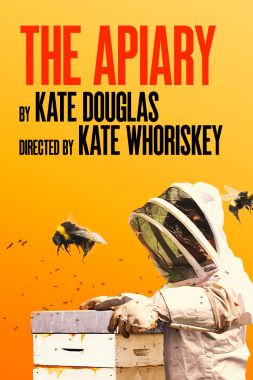A STICKY SCRIPT
Bees, those often annoying little creatures who have a knack for showing up at just the right time to ruin any number of outdoor activities, serve an important function. Namely, pollination — an act that is vital for our survival as human beings. So, like it or not, we need bees. However, the global bee population has been in decline for a few decades with some dire predictions of possible bee extinction by 2050. A global disappearance of bees would have devastating effects on the worldwide food supply and put millions of florists out of work. Playwright Kate Douglas’s uneven new play, The Apiary, currently performing at Second Stage‘s newly renamed Tony Kiser Theater, takes us into a not-too-distant future where the negative effects of bee decline have inarguably manifested and a workable solution is not apparent. Douglas’s work is presented under the auspices of the Second Stage Next Stage Festival and, even with Kate Whoriskey’s sure-handed direction, the writing proves to be in need of a few more stages before flying the hive.
April Matthis and Carmen M. Herlihy
At lights up, a beautiful, young African woman (a versatile Nimene Wureh) directly addresses the audience. Well, not the audience really but audience as a support group for patients with terminal illness. Seemingly unrelated, we are next in a basement lab of a medical corporation. In this basement that is now a synthetic apiary (all those bees but no buzzing sounds?), an overworked and underpaid laboratory supervisor Gwen (an effective Taylor Schilling) and her equally under-appreciated technician Pilar (a moving Carmen M. Herlihy) struggle to keep the bees they are studying alive.
April Matthis and Carmen M. Herlihy
Staying hopeful about their work is tough and their stress levels aren’t helped by the unexpected arrival of a new lab tech neither was expecting. Though highly overqualified for the job, Zora (a solid April Mathis) was hired by the intimidating executives “upstairs” without Gwen’s input. So, despite Gwen’s concerns, the new tech stays. Soon Zora, a former research executive who holds a PhD, begins implementing her own, sometimes competing ideas about the best way to help the bees. This low-key undermining makes the high-strung Gwen even more nervous while big-hearted Pilar tries to keep the peace in the lab by being the conciliatory tech-in-the-middle. When a former co-worker is unexpectedly discovered dead in the lab one morning, Zora inadvertently realizes a new way to help the bees. But will it work? And is it ethical?
April Matthis, Nimene Wureh, and Carmen M. Herlihy
At a running time of seventy minutes with no intermission, the show is truly a short play. And like some other short plays, it gives short shrift to the logic of the world the show is creating in service of larger points it attempts to make. For instance, the obvious obstacles to implementing Zora’s new plan have basically been ignored. This omission alone sometimes takes us out of the play. Also, the play doesn’t clearly set up the importance of bees. It is subtly laid in but that subtlety, though nice, is also easy to miss. And without that knowledge, audience members may sit there wondering “…what’s the big deal”?
Carmen M. Herlihy and April Matthis
Also, the show is tonally inconsistent. Is it a comedy? Drama? Meditation on the relationship between humans and nature? A dystopian horror exercise? Douglas’ writing has elements of all, which are effective in their own right. But together, at least at this point, it creates a journey that is not exactly sure of the road it is travelling.
Nimene Wureh
However, the production boasts good performances all around, particularly from Ms. Herlihy. Her work is charming and compelling and filled with a powerful humanity that is very touching and relatable. There is a “Queen Bee” character, non-verbally portrayed by stunning dancer, Stephanie Crousillant. While Ms. Crousillant’s physical embodiment of a bee is extraordinary, there are times when this conceit veers into Jeff Goldblum/The Fly territory. Yet, to be sure, there are some very engaging moments in Douglas’s writing. The way she eventually connects the African young woman at the top of the show to the lab situation is quite clever and unexpected.
Taylor Schilling and Nimene Wureh
The Apiary is potentially a very good play but still needs work, which may be the point of its inclusion in this festival. Here’s hoping that with further development, the show’s elements will coalesce in a way that makes it run as smoothly as, well, honey.
[Editor’s note: Kara Young(Purlie Victorious) will perform Zora, usually performed by April Matthis, for the final week of performances February 28 – March 3.]
Taylor Schilling, Carmen M. Herlihy, and April Matthis
photos by Joan Marcus
The Apiary
Second Stage Theatre
Tony Kiser Theatre, 305 West 43rd St.
70 minutes, no intermission
opened February 13, 20234; ends on March 3, 2024
for tickets, call 212.541.4516 or visit 2ST


{ 1 comment… read it below or add one }
Needs works…not worth the money and/or time.